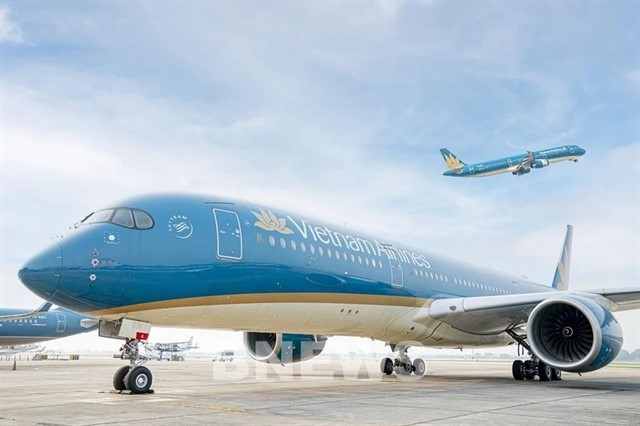However, global economic and political situation would remain challenging, continuing to impact the airline industry.

Vietnam Airlines said that it will maintain the strong recovery momentum that has been building since 2023, the national flag carrier said at its shareholders' meeting on June 21.
Speaking at the event, CEO Lê Hồng Hà said that in 2024, the global economic and political situation would remain challenging, continuing to impact the airline industry.
Globally, the ongoing conflicts between Russia-Ukraine and Israel-Hamas have disrupted supply chains, greatly affecting productions and economies.
Fuel prices are expected to stay high, around US$104 per barrel, driving up Vietnam Airlines' operating costs. A $1 per barrel change in fuel price translates to around VNĐ230 billion (US$9 million) in annual cost fluctuations for the company.
Meanwhile, aerospace manufacturer Pratt & Whitney has recalled engines on the A321 and A320 Neo aircraft, causing an aircraft shortage expected to last until 2025. This is directly impacting airlines' operating plans, recovery efforts and network expansion.
These external factors are putting significant pressure on the business operations of airlines in general, including Vietnam Airlines.
Consequently, Vietnam Airlines has set a target in its 2024 business plan of transporting an estimated 22.64 million passengers, a 7.6 per cent increase from the same period last year, though still equivalent to only 99 per cent of the 2019 passenger volume.
It has set a consolidated revenue target of over VNĐ105.9 trillion for 2024, up 113.6 per cent over the previous year. The company aims to achieve a consolidated profit before tax of more than VNĐ4.5 trillion, with the parent company's profit reaching VNĐ105 billion.
To achieve the financial goals, Vietnam Airlines is implementing a comprehensive set of measures including ramping up revenue and income generation, as well as continuing to rigorously manage and optimise costs. The airline also plans to improve the efficiency of resource utilisation, particularly its aircraft fleet.
Notably, it intends to divest its stake in Tân Sơn Nhất Cargo Services JSC, which is expected to generate around VNĐ1.7 trillion. This additional cash flow is expected to help the parent company and the consolidated business achieve a balanced income statement in 2024, with the parent company's profit before tax reaching VNĐ105 billion and the consolidated profit before tax hitting VNĐ4.5 trillion.
If it achieves these projected business results, Vietnam Airlines is expected to maintain a balanced cash flow throughout the year. The estimated closing balance is around VNĐ517 billion, and the airline's short-term solvency is also expected to see a slight improvement.
However, the lingering negative impacts of the COVID-19 pandemic in previous years mean that Vietnam Airlines' overall financial position at the end of 2024 is still anticipated to be in a state of significant imbalance.
The parent company's shareholder equity is projected to be in the negative of around VNĐ8.2 trillion, while the consolidated shareholder equity is forecasted to be negative VNĐ17.9 trillion.
Vietnam Airlines is implementing a comprehensive restructuring plan focused on divesting from subsidiaries, rescheduling debt and enhancing operational efficiency through organisational changes, technology investments and digital transformation, all with the aim of addressing the negative financial impacts of the COVID-19 pandemic and gradually restoring the company's financial health. — VNS
- Tags
- Vietnam Airlines





